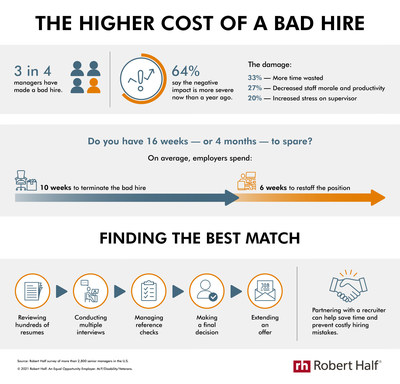Companies today have more at stake if they make a hiring mistake, new research from global staffing firm Robert Half shows. More than 3 in 4 senior managers surveyed (76%) admit to recruiting the wrong candidate for a role, and nearly two-thirds (64%) said the negative impact is more severe now than it was a year ago.
Four Months Lost on One Hiring Mistake
When it comes to their most recent regrettable hire, senior managers said it took 10 weeks, on average, to realize the person was a poor match and to let them go, and an additional 6 weeks to restaff the role. That’s a total of 16 weeks, or 4 months, of time squandered on a recruiting blunder.
Where Companies Waste More Time
According to the research, which looked at 28 major metropolitan U.S. cities, some employers take even more time to correct a hiring mistake:
- Seattle: 26 weeks
- Minneapolis: 25 weeks
- Los Angeles: 23 weeks
- Boston: 20 weeks
- Dallas, Philadelphia, San Francisco: 19 weeks
- Miami, New York: 18 weeks
- Cleveland, Denver, San Diego: 17 weeks
“In the past year, companies have made big transitions, including the move to remote work and shifts in their hiring and onboarding practices,” said Paul McDonald, senior executive director at Robert Half. “When faced with so many changes, there can be more room for error and, unfortunately, a bad hiring decision can have a ripple effect throughout the organization.”
What’s at Stake for Employers
Senior managers reported the biggest tolls on their teams and company as follows:
- Time wasted hiring and training the new employee
- Decreased staff morale and productivity
- Increased stress on the supervisor
McDonald noted, “Common hiring mistakes can be prevented by establishing an effective and efficient candidate evaluation process and working with outside partners to expedite time-consuming steps and help secure the best match.”
For tips on avoiding the most common hiring mistakes, visit the Robert Half blog.
Thanks for reading CPA Practice Advisor!
Subscribe Already registered? Log In
Need more information? Read the FAQs
Tags: Staffing
![Bad-Hire-IG_FINAL[1]](https://www.cpapracticeadvisor.com/wp-content/uploads/2021/03/Bad_Hire_IG_FINAL_1_.60539d24782fa.png)




